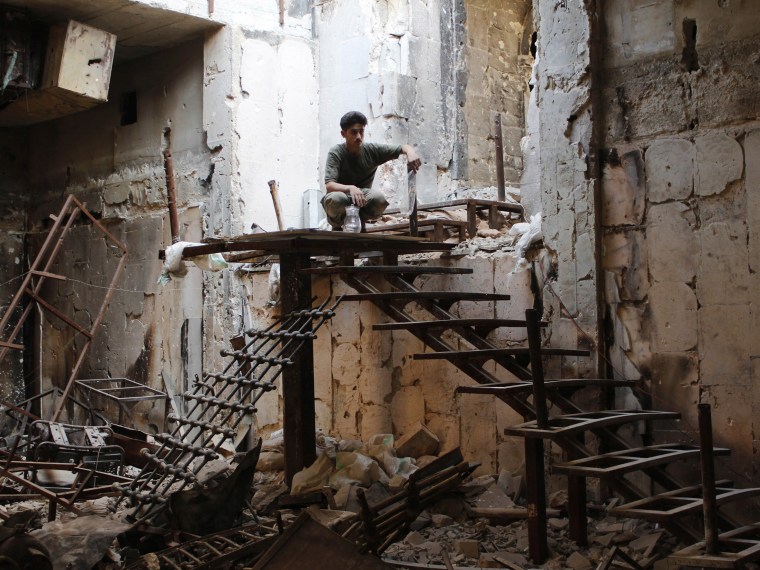Less than four hours before President Obama addressed the nation about Syria and indicated he'd leave it to Congress, a panel of international relations and Middle East experts discussed the idea of American credibility and the government’s sense of responsibility on Melissa Harris-Perry.
While Secretary of State Kerry has argued that the Assad regime’s use of chemical weapons presents a national security threat, and President Obama has assured that inaction risks “making a mockery of the global prohibition on the use of chemical weapons,” host Melissa Harris-Perry asked her panel whether striking the Assad regime would be enough to establish the United States as a strong world force that stands against chemical warfare.
P.J. Crowley, the former U.S. Assistant Secretary of State for Public Affairs, acknowledged that the planned strike is limited in scope and avoids the involvement of U.S. troops on the ground.
“What’s remarkable about the argument for this attack is gone is the transformative language of 10 years ago or even two years ago,” said Crowley. “This is a sober, realistic assessment of what can be done. It’s a limited step.”
READ: Adam Serwer with a closer look at Obama's "broad" Syria strike plan
Crowley went on to warn that a missile strike might be the first of many more potential levels of involvement with Syria, as military participation beyond the possible missile launch might be necessary to curb the increasing violence in the Syrian civil war.
MSNBC military analyst Jack Jacobs, a retired Army colonel and Medal of Honor recipient, agreed that if the United States launches the cruise missiles, then effectively preventing the atrocities of chemical warfare and maintaining America’s credibility as a world force might necessitate additional, prolonged military action.
“If we have no positive effect on the long-term outcome in Syria,” said Col. Jacobs, “despite what the president and the secretary of state have said about the limited nature of the attacks, what credibility we do establish by making this attack I think gets eroded over time.”
Though any U.S. military involvement in Syria, however limited, could lead to further engagement, that speculation remains to be seen, and PBS Newshour political editor Christina Bellatoni maintained that it is reasonable for President Obama to act on the violence in Syria now, in the wake of the recent chemical attack. It’s an issue of perception and consistency for the president, Bellatoni said.
Crowley agreed that launching an attack on the Assad regime is a matter of upholding “the international standards that we hope we’re advancing in the 21st century.” If Obama has drawn a “red line” in the sand to marks those standards, “it is vitally important to defend it,” said Crowley.
But, drawing the panel’s attention back to the 2003 decision to intervene in Iraq, Colonel Jacobs expressed his concern about American short-term memory.
“We have very short memories I’m afraid, but we’ve got to remember how this all transpired, and we had plenty of opportunity to avoid this very situation and to short circuit our optionality in this. We shouldn’t do this again.”
With the president’s decision that the United States should intervene in the Syrian civil war but that Obama will wait for Congressional approval, a new panel of reporters and political science experts joined Harris-Perry’s table on Sunday to discuss the question of time, impact, and credibility, and to ask the question now looming before the nation: What will Congress ultimately decide?
Sunday's panelists, including Disrupt host Karen Finney, echoed Saturday's in questioning the effectiveness of limited military involvement. How We Fight author Dominic Tierney questioned the long-term strategy of an attack against Syria. He asked, like Finney, if striking the Assad regime would stop Assad from killing thousands of civilians--by chemical or non-chemical weapons.
“I actually doubt it will be very effective, whether it happen now or in two weeks time, to be honest with you,” said Tierney. “This is a war for credibility--America’s credibility, Obama’s personal credibility, the Democratic Party’s credibility. At least that’s how it’s set up. The question I have is what is the strategy?”
Answering the question of how this potential war would be set up, Enough Project research director Mark Quarterman outlined the ally-less predicament in which the president has found himself. The lack of backing from the United Nations General Assembly or the Security Council, which has not finalized its findings after its trip to the war-torn country, and Great Britain’s withdrawal of support since British parliament voted against U.K. involvement all contributed to Obama’s decision to ask for authorization from Congress--a Congress frequently rendered immobile because of deeply entrenched partisan divides.
Democratic Congresswoman Barbara Lee of California spoke with Harris-Perry Sunday about the 113th Congress’s tendency to allow partisan issues to obstruct necessary decision-making, citing recent difficulty passing a substantive jobs bill. But Representative Lee, who wrote a letter to the president on August 29 urging him to seek Congressional approval for military action, said she expects productive, robust debate on the House and Senate floors. Because of the gravity of Syria’s use of chemical weapons, Representative Lee said Congress understands that this is a time for a vote reflective of a truly bipartisan consideration of the facts and potential consequences of military involvement. She added that she is pleased the president is seeking Congressional approval because the public can now reach a full understanding of the dilemma through the debate their elected officials will engage in.
“This is a moment, however, where Democrats and Republicans must come together and really make some decisions as to how to move forward,” said Lee. “We’re the representatives of the people and people deserve to have their voice heard.”
Watch Harris-Perry's interview with Rep. Lee below, and the rest of the weekend's coverage on MHPshow.com. Tune in to MHP on Saturday at 10am ET for more discussion.
